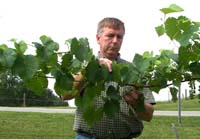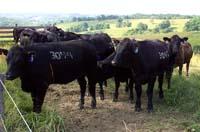UK's Eden Shale Research Farm: Helping Farmers Nearly 50 Years
UK's Eden Shale Research Farm: Helping Farmers Nearly 50 Years


Beef cattle research includes fly ear tags and reducing tall fescue endophyte toxicity.
Nearly 50 years of studies at Eden Shale Research Farm have demonstrated that agricultural enterprises will succeed and increase farm income in a group of Kentucky counties with very steep slopes and an unusual soil type. Part of the University of Kentucky College of Agriculture, Eden Shale is in the center of a triangle formed by Cincinnati, Louisville and Lexington.
One of the first projects was to clear land and plant tall fescue to prevent erosion.
“Fescue helped save the Eden Shale hillsides,” said O.D. Hawkins, who helped establish the facility and was its manager for 24 years.
Tall fescue grass and beef cattle grazing studies remain a major research focus. Other projects include cattle feed supplements, tobacco, alfalfa, red clover and grape variety trials, and a grape trellis demonstration.
Although fescue is ideal for steep slopes because it grows vigorously and the root system holds soil, the grass is infected with a fungal endophyte that decreases performance and causes reproductive problems in livestock grazing it. To dilute these effects, livestock producers typically add clovers and other grasses to fescue pastures.
However, beef cattle at Eden Shale are put on pure fescue stands to evaluate management practices that may offset effects of the endophyte, according to Joe Wyles, ESRF manager since 1979.
These management practices include early weaning of calves, changing the breeding season time, crossbreeding, and testing various mineral and feed supplements. Calves are weaned in the fall and wintered on backgrounding trials from which replacement heifers are chosen. To relieve heat stress caused by fescue toxicity, half the cattle are bred to have one-fourth to one-half of a heat-tolerant breed. Steers and cull heifers are sold, used on spring grazing tests, or finished to slaughter weights on experiments.
The farm has 291 beef cattle, including a crossbred-cow herd of 120 to 125 head.
“These cows have been raised on pure fescue all their lives,” Wyles said. “We’re weaning calves close to 600 pounds off infected tall fescue. This shows that you can successfully raise cattle on fescue by using various management strategies.”
Eden Shale has provided much of the information on practical methods to deal with the fescue endophyte, according to Kim Strohmeier, Owen County Extension agent for agriculture and natural resources.
Forages cut for hay go into a new barn. Timber for the red cedar and white oak walls was cut from trees on the farm. Lumber was prepared using a portable sawmill from Robinson Research Station, a College of Agriculture research facility in Breathitt County.
Tobacco research is conducted on some of the 26 acres of bottom land. Eden Shale Farm is one of the final trials before a new variety is released.
Over the years, several innovative projects have been conducted at Eden Shale Research Farm. Some of these were firsts in the area or beyond. Several of them had a national influence on agriculture.
One project was on insecticide-impregnated ear tags for beef cattle fly control.
“Using ear tags is now one of the most widely used methods to control flies on beef cattle,” Wyles said. “Since fly tags were introduced, we’ve tested them every year for effectiveness before they were marketed to beef producers.”
A no-till drill for forages also was developed from tests at Eden Shale.
“Scientists believed that if the drill would work on our steep slopes and unique soil, it would work anywhere,” Wyles said. “Agronomists experimented on how deeply to plant seed. Agricultural engineers designed a machine to plant seed. They would bring it up here, tear it up, and go back to Lexington to work on it some more. The years of research resulted in the John Deere Power Till Seeder.”
The Kentucky Central Bull Performance Test was conducted at Eden Shale for 14 years. More than 2,000 bulls were consigned and evaluated during this time. The top two-thirds of the bulls were sold following the tests each year.
“During the time we had the performance test and sales, we had lots of visits from farmers looking for bulls to buy as well as consigners checking on their bulls,” Wyles said. “When bull sales took place here at the farm, we also had beef cattle field days. More than 500 people attended the field days and sales each year. These gave people opportunities to acquire current research information and to see and buy a performance-tested bull. Farmers in the area purchased many of those bulls, and this helped improve the quality of beef cattle herds in this region.”
Area county Cooperative Extension agents for agriculture and natural resources have planned field days at the research farm, continuing to provide research-based information to address needs and concerns of farmers in the region.
Over the years, several research projects have led to new farming operations in
the region, according to Hawkins.
“We had 50,000 Christmas trees in a demonstration project,” he said. “People would come see it and go start their own Christmas tree farms. We also had a 500-tree apple orchard. It was an outstanding demonstration. Several orchards were begun in the area as a result of this research.”
Some early projects like you-pick strawberries and greenhouse-grown lettuce, tomatoes and onions were a novelty at that time, according to Hawkins.
Graduate students continue to conduct research projects at Eden Shale to help farmers increase income from existing operations as well as diversify by establishing new enterprises. This research-based knowledge is used in fields, laboratories and classrooms.
Sources: Joe Wyles 502-484-5531
O.D. Hawkins 502-484-5531
Kim Strohmeier 502-484-5703